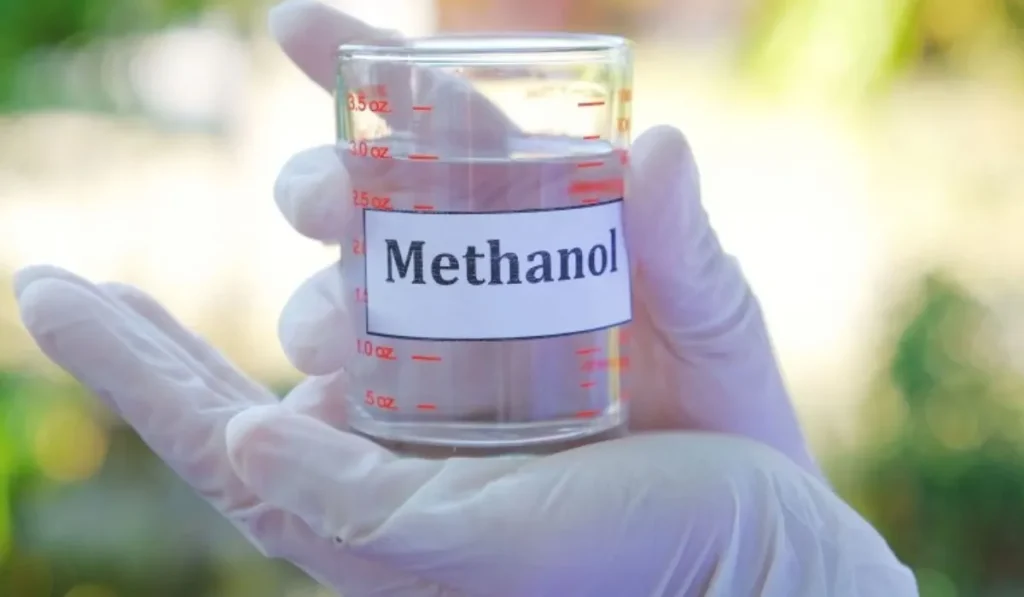A gallon of methanol weighs approximately 6.6 pounds (2.99 kg). This weight can vary slightly depending on temperature and pressure.
Methanol, also known as methyl alcohol, presents itself as an essential chemical in various industrial applications.
This clear, colorless liquid, with its characteristic odor, is widely used as a solvent, antifreeze, fuel, and as a feedstock for the production of formaldehyde and other chemicals.
It is critical for those handling methanol to be aware of its physical properties, including its weight. Understanding the weight of methanol per gallon is crucial for transportation, storage, and handling, ensuring safety protocols are appropriately followed.
The precise knowledge of methanol’s weight allows industries to plan logistics efficiently while complying with material safety regulations.
As such, methanol remains a valuable commodity in the chemical industry, integral to a wide array of production processes.
The Basics Of Methanol
Methanol, often known as wood alcohol, is a powerful player in the chemical industry. Its simple structure, CH3OH, hides its versatility and significance.
A colorless liquid that burns with a non-sooty flame, methanol serves multiple roles across diverse sectors. From fuel to antifreeze, the substance is a chameleon in industrial use.
A gallon of methanol, which equates to about 3.785 liters, weighs approximately 6.6 pounds or 2.99 kilograms at 20°C.
Identifying Methanol Characteristics
Methanol’s physical properties make it stand out:
- Appearance: Clear, colorless
- Odor: Slightly alcoholic
- Boiling Point: 64.7°C (148.5°F)
- Flash Point: 11°C (52°F)
- Solubility: Miscible with water, ethanol, ether, and most organic solvents
Despite its utility, handling methanol requires care due to its toxicity and flammability.
Common Uses Of Methanol
Methanol is a key ingredient in various applications:
| Industry | Use |
|---|---|
| Automotive | Fuel additive, antifreeze |
| Construction | Solvent in paint, varnish |
| Pharmaceuticals | Denaturant, lab solvent |
| Energy | Feedstock for biodiesel |
Methanol also plays a crucial role in producing formaldehyde, acetic acid, and other chemicals.
Weight Essentials

Understanding how much a gallon of methanol weighs is crucial for both industrial and laboratory use.
Methanol, a light, volatile, colorless, flammable liquid with a distinctive odor, is a commonly used solvent in various applications. It’s vital to note that the weight of methanol can vary based on several factors.
Factors Affecting Methanol’s Weight
Methanol is not a one-size-fits-all substance. Its weight can change with different conditions. This section dives into what can alter the weight of a gallon of methanol.
- Temperature: As temperature increases, methanol expands, which may lower its weight per gallon.
- Purity: The presence of water or other substances can affect methanol’s weight. Pure methanol weighs differently.
- Altitude: At higher altitudes, atmospheric pressure decreases, which can slightly alter methanol’s density and weight.
Comparison With Other Solvents
Let’s put methanol’s weight into perspective by comparing it with other solvents. We’ll look at the weights of common solvents in a gallon container.
| Solvent | Weight per Gallon |
|---|---|
| Water | 8.34 lbs |
| Ethanol | 6.58 lbs |
| Isopropanol | 6.55 lbs |
| Methanol | 6.61 lbs |
| Acetone | 6.65 lbs |
This value can vary based on the factors mentioned above.
Measuring Methanol

Knowing how much a gallon of methanol weighs is crucial in many industries. Methanol, a light, volatile, colorless, flammable liquid with a distinctive odor, is used widely, from antifreeze to fuel.
Weighing methanol correctly is incredibly important for safe handling and accurate use.
Volume To Weight Conversion
To convert the volume of methanol to weight, you need its density.
- Methanol has a density of about 0.791 grams per milliliter.
- This means that one gallon, which is equal to approximately 3,785 milliliters, weighs around 2.99 kilograms (or about 6.59 pounds).
For quick reference:
| Gallons | Milliliters | Kilograms | Pounds |
|---|---|---|---|
| 1 | 3,785 | 2.99 | 6.59 |
Impact Of Temperature On Volume
Temperature changes affect methanol’s volume.
- When hot, methanol expands.
- When cold, it contracts.
This means measurements might vary with temperature changes.
Use temperature-compensated tools for accurate measurements.
Quick Facts About Methanol Weight
Welcome to the ‘Quick Facts about Methanol Weight’ section of our blog post. Methanol is a common chemical used across various industries. Knowing its weight is crucial for transportation, storage, and usage guidelines.
These quick facts give an accurate insight into the weight of methanol by the gallon and its metric equivalents.
The Standard Weight Of A Gallon Of Methanol
Weighing methanol is straightforward. A gallon of methanol typically weighs about 6.61 pounds at 68°F (20°C). This number is vital for those needing precise measurements for scientific or industrial applications.
Metric Equivalents
Converting weights to metric units helps in global communication. Here is how a gallon of methanol translates:
- 1 gallon of methanol = 6.61 pounds
- 1 pound = 0.453592 kilograms
Therefore, 6.61 pounds of methanol equals approximately 3 kilograms.
| Gallon | Pounds (lbs) | Kilograms (kg) |
|---|---|---|
| 1 | 6.61 | ~3 |
Practical Applications
Knowing how much a gallon of methanol weighs is crucial for various industries. Methanol, also known as wood alcohol, plays a critical role in manufacturing, from creating plastics and pharmaceuticals to powering our vehicles.
Its weight affects transportation costs, mixture ratios for chemical processes, and safety protocols in workplaces. Let’s delve into how this information applies in practice.
Calculating For Large-scale Productions
When dealing with methanol in large quantities, precise calculations are necessary. A gallon of methanol typically weighs around 6.6 pounds or 2.99 kilograms. For large-scale production, where thousands of gallons are common, knowing the exact weight is essential for the following:
- Cost estimation for shipping and handling.
- Formulating the correct chemical mixtures.
- Ensuring the capacity limits of storage tanks are not exceeded.
Companies may use the weight data to optimize their processes, leading to better efficiency and cost savings.
Safety Considerations In Handling Methanol
Safety measures are a top priority when dealing with methanol. Its weight not only affects operational parameters but also workplace safety. Being aware of its weight is beneficial for:
- Preparing the correct handling equipment, like forklifts and cranes.
- Designing emergency response plans in case of spills or leaks.
- Calculating the necessary strength of personal protective equipment (PPE).
Diligence in these areas prevents accidents, protects workers, and complies with health and safety regulations.
Beyond The Gallon
Discussing a gallon of methanol weighs more than just numbers. It’s about the impact each gallon creates. The weight of methanol in a gallon is around 6.6 pounds. But its load on the ecosystem and the evolving methods of its production are hefty topics.
Environmental Impact Of Methanol Use
Methanol’s influence on the environment is worth attention. It’s used in many industries, from automotive to energy.
- Releases CO2 when burned
- Can contaminate water sources if spills occur
- Bio-methanol production offers a greener alternative
Understanding these effects helps in making responsible choices. Bio-methanol, for instance, comes from renewable sources. This makes it a more sustainable option.
Future Trends In Methanol Production
Technological advances show promising shifts in how the world produces methanol.
- Carbon capture techniques could reduce emissions
- Innovations in the production process might lower costs
- Renewable feedstocks are gaining traction, providing a cleaner methanol variant
This means future methanol will likely be cleaner and more affordable. It’s an exciting time for this industry, with advancements potentially changing how we view this simple chemical.
FAQs About the weight Of A Gallon Of Methanol
What Is The Weight Of One Gallon Of Methanol?
One gallon of methanol weighs approximately 6. 6 pounds (lbs) or about 2. 99 kilograms (kg). This weight is based on methanol’s density at 68°F (20°C).
How Does Temperature Affect Methanol’s Weight?
Temperature impacts methanol’s density, and hence its weight per gallon. As the temperature increases, methanol expands, slightly decreasing its weight. Conversely, colder temperatures make it denser and heavier.
Can Methanol’s Weight Vary With Purity?
Yes, the weight of methanol can vary with purity levels. Impurities can either increase or decrease its weight. Pure methanol will have a more consistent weight per gallon.
What Factors Influence Methanol’s Gallon Weight?
Factors affecting methanol’s weight per gallon include temperature, purity, and atmospheric pressure. However, temperature is the most significant factor in everyday situations.
Conclusion
Wrapping up our discussion on the weight of methanol, we’ve explored various factors that influence its mass.
A gallon typically weighs around 6. 6 pounds, yet variations can occur due to temperature or purity. Remember, handling methanol safely is crucial, as it’s a volatile substance.
For precise measurements, always rely on calibrated equipment and consult material safety data sheets.
Whether for industrial applications or scientific research, understanding methanol’s weight is key to successful utilization.
Resources:
https://afdc.energy.gov/fuels/emerging-methanol
https://www.cdc.gov/niosh/topics/methyl-alcohol/default.html
